1812: our climate and our winter fought for us?
The main thing is to outsmart
12 failures by Napoleon Bonaparte. On the eve of the decisive battle with Napoleon, Russia made a deceptive impression of a power that was by no means willing and, by and large, not ready for war. At the same time, it is simply amazing how usually the secretive Alexander described in detail to the future enemy how he was going to fight.
In May 1811, the king informed the French Ambassador Kolenkur:
Obviously, they did not believe Alexander in Paris, taking his words for ostentatious bravado. But in this case, he spoke very sincerely. Kutuzov’s characteristic statement regarding Napoleon is well known: “I can’t defeat, I’ll try to outsmart”. It is unlikely that Alexander was in this disagree with the one whom he soon appointed commander in chief.
So, long before the outbreak of hostilities in St. Petersburg, we decided on the main components of the strategy to fight Napoleon: evading the general battle, retreating inland (and, as Volzogen planned, two armies will retreating), incessant harassing attacks and disruption of communications, in including through sabotage and partisan raids.
The climatic factor was also taken into account. Obviously, even then the probability of surrender of one of the capitals was not ruled out. It is possible that precisely for this reason, Alexander took the abandonment of Moscow quite calmly. In a letter to the same Bernadotte, he rightly remarked: "This is a cruel loss, but more in relation to moral and political than military."
It remains to add that thanks to the brilliant work of Russian intelligence under the leadership of Colonel Muravyov, Petersburg was informed in detail about the state of Napoleonic troops. And by the beginning of the war, Alexander and his Minister of War knew perfectly well what they needed to do, what the enemy was going to do and what he was capable of.
The development of an immediate plan of action for the Russian army is associated with the name of the Prussian general Karl Ful. Fula and his plan were not scolded except by the lazy one, beginning with his former subordinate and namesake Clausewitz and ending with modern historians, both domestic and foreign. But this option itself did not play, and indeed should not have played a decisive role.
As you know, in accordance with it, Russian troops were divided into three armies. A similar division was present in all pre-war developments, which, of course, was not an accident, much less a miscalculation. The division excluded the possibility of a frontier general battle and significantly reduced the risk of a complete defeat of the army, creating the prerequisites for a further retreat.
In accordance with the behavior of the enemy, Napoleon also had to redistribute his forces. And what is fraught with such a division for the French commander, a clear example of Waterloo was shown. The consequences during the Russian campaign, of course, were not so dramatic, but they were.
Coordination of actions was violated, conditions arose for various inconsistencies, misunderstandings and even conflicts between military leaders, similar to the "showdown" between Jerome Bonaparte and Marshal Davout. All this directly affected the effectiveness of operations of the Great Army. It is difficult to say whether analysts of the Russian military department took this factor into account, which, nevertheless, played into our hands.
As for the idea of Ful with the Drisse fortified camp, which was supposed to play an important role in the confrontation with the French and did not play it, it is hardly worth exaggerating this secondary circumstance, which did not critically affect the course of hostilities.
Patience Brings Victory
The 1 Army under Barclay spent only five days in the Dries camp. On July 1, the emperor arrived here, on the same day a military council took place, where it was decided to leave the camp, the 1 Army on the next day to withdraw to Vitebsk and further to connect with the 2 Army of Bagration. That is, the initial plan did not fundamentally change, but was only adjusted taking into account the operational situation.
However, the most elaborate plan still needs to be implemented. Only to whom? Alexander left the army without appointing a commander in chief. The emperor could not help but realize that such a strange decision greatly complicates the command and control of the troops, prevents them from carrying out their tasks and puts commanders in an ambiguous position. But he had his own reasons for doing so.
The unfolding "Scythian war" came into sharp conflict with the patriotic upsurge in the country. Alexander, whose grandfather and father lost their lives and power as a result of a conspiracy of disgruntled nobles, could not ignore public opinion. He could not refuse the strategy of retreating inland - the only one capable of bringing success.
There was a paradoxical situation. On the one hand, the authorities in every possible way encouraged the growth of anti-French sentiments and called for a mortal struggle against the invaders, and on the other, they consistently implemented the war plan, which included evading decisive clashes with the enemy.
The way out of this situation could not be optimal. Actually, he was not there. Alexander considered it best to distance himself from the leadership of the army, which means - as far as possible in principle, to relieve himself of responsibility for what is happening.
Formal anarchy in the troops allowed the emperor, as if from outside, to observe the confrontation between the "patriot" Bagration and the "traitor" Barclay, who was tearing into battle, waiting for how it would end. It was an extremely risky game, but the king decided that other options are fraught with even greater threats.
Alexander’s subjects, longing for the victory of Russian weapons, stubbornly rejected the only opportunity to win this victory. The main "culprit" of Barclay de Tolly's retreat, his closest assistants, Volzogen and Levenstern, and at the same time all the other generals with "wrong" names, turned out to be a convenient target for defamation.
The "Russian Party" violently attacked the "German defeatists", accusing them of cowardice, indifference to the fate of the Fatherland, and even direct treason. However, it is difficult to separate the insulted sense of national pride and sincere delusions from selfish motives: the desire to amuse the wounded ambition and quietly improve one's career position.
Of course, arrows aimed at the Minister of War, touched the emperor. And the further, the more. However, Alexander waited as much as possible, and removed Barclay from the army only after the combined armies left Smolensk. “The Moor has done his job”: the pre-war plan was broadly implemented - the enemy was lured inland, threatening his communications and preserving the combat-ready army.
However, a further retreat led by a military leader with a reputation as Barclay was fraught with an explosion. The commander-in-chief was urgently needed, whose appointment seemed to cross out the prolonged period of imaginary failures and open a new stage in the campaign. It required a person who was able to inspire the army and people.
Mikhail Illarionovich Kutuzov with his surname and public relations, as was already written in "Military Review", was all right. The army left "talk, and only", but "Kutuzov arrived to beat the French."
The Most Serene Prince was an experienced and talented general, but at that moment other qualities came to the fore. Kutuzov was popular, and in addition, he was distinguished by the cunning of Odysseus and the ability to slip between Scylla and Charybdis or climb into the eye of a needle.
You can’t retreat
The new commander had to solve the following puzzle: "you can’t retreat to fight." And Kutuzov began to dot the right place: first he retreated, then he gave battle. He retreated because the operational situation required it, and gave battle, because Russia would not have taken a different decision.
Although Kutuzov had left without a fight, the French, oddly enough, would have been in Moscow in an even more difficult situation. Indeed, without losses incurred near Borodin, they needed more food and fodder, more effort to manage and maintain discipline. But Kutuzov or any other commander in his place could not have acted otherwise: the moral factor at that moment was of key importance.
In the battle of Borodino, Kutuzov faced the task of at least preventing the crushing defeat of the Russian army, and it was successfully solved. Next came the final phase of the campaign. All conditions for its successful completion have been created. Noteworthy is the fact that the main food bases for the army were located in Novgorod, Tver, Trubchevsk - a hundred miles south of Bryansk, and in Sosnitsy in the Chernihiv region, exactly on the periphery of the theater of operations.
Their location perfectly matched the balance of power that arose after the loss of Moscow and the Tarutin maneuver, when Russian troops reliably covered the northwestern and southwestern directions.
Given the fact that the production of weapons and their storage was concentrated in Tula, as well as Petersburg and its environs, the Russian troops (including the Wittgenstein corps, which successfully operated near Polotsk, and the 3 army in Volhynia) relied heavily on the rear, which could quickly provide them in the right amount with everything you need. And the rear of Napoleon was almost his complete absence, constantly interrupted by a thin line of thousand-kilometer communication.
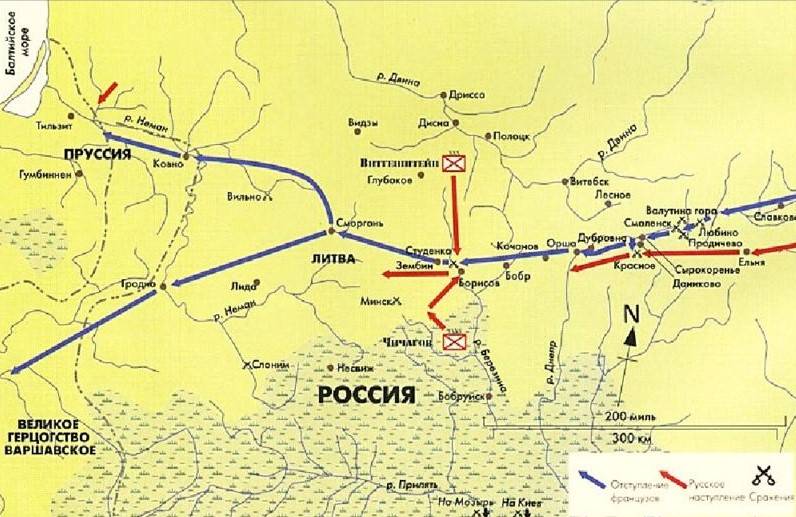
I would not want to represent Napoleon as a naive simpleton, which he was not. So Bonaparte correctly assessed the appointment of Kutuzov as Alexander’s concession to the nobility, correctly assumed that the new Russian commander would give a general battle, which would then turn into the surrender of Moscow.
But unraveling the intentions of the enemy, Bonaparte did not derive practical benefit from this. This feature of Napoleon’s behavior was characteristic of him throughout the campaign: the Corsican seemed to really assess the situation and the impending risks, but this almost did not affect his actions.
There is no secret here. Literally from the first to the last minute of his stay in Russia, Bonaparte played according to the rules imposed by the enemy. Alexander had his own script, which he followed, as far as the situation allowed him.
After Napoleon’s plan to give a big frontier battle turned out to be unrealistic, the Great Army did not have a new strategic plan. Climbing deeper and deeper into Russia, the French continued to wage their "Central European War", as if not noticing that they were acting under the dictation of the Russians, steadily approaching death.
This is not to say that Napoleon did not foresee a fatal outcome. Even before going to Russia, he declared to Austrian Chancellor Metternich: “The triumph will be the lot of the more patient. I will open the campaign by crossing the Neman. I will finish it in Smolensk and Minsk. I will stay there. ”
However, he did not stop. Three times - in Vilna, Vitebsk and Smolensk - the emperor seriously thought about the appropriateness of further advancement. Moreover, in Smolensk, he was advised to stop even such desperate heads as Ney and Murat.
With perseverance worthy of a better application, Napoleon did not want to take an example of patience from the enemy, but continued to climb into a set trap. The emperor clearly recognized that a halt, let alone a retreat from Russia without concrete results, would be perceived by Europe as an obvious sign of weakness, and the allies, who today devotedly look into his eyes, will clutch their throats tomorrow.
Napoleon admitted in a conversation with his close associate long before the invasion of Russia. Fear of ceasing to be terrible drove the emperor forward in the hope of his lucky star, which was relentlessly declining.
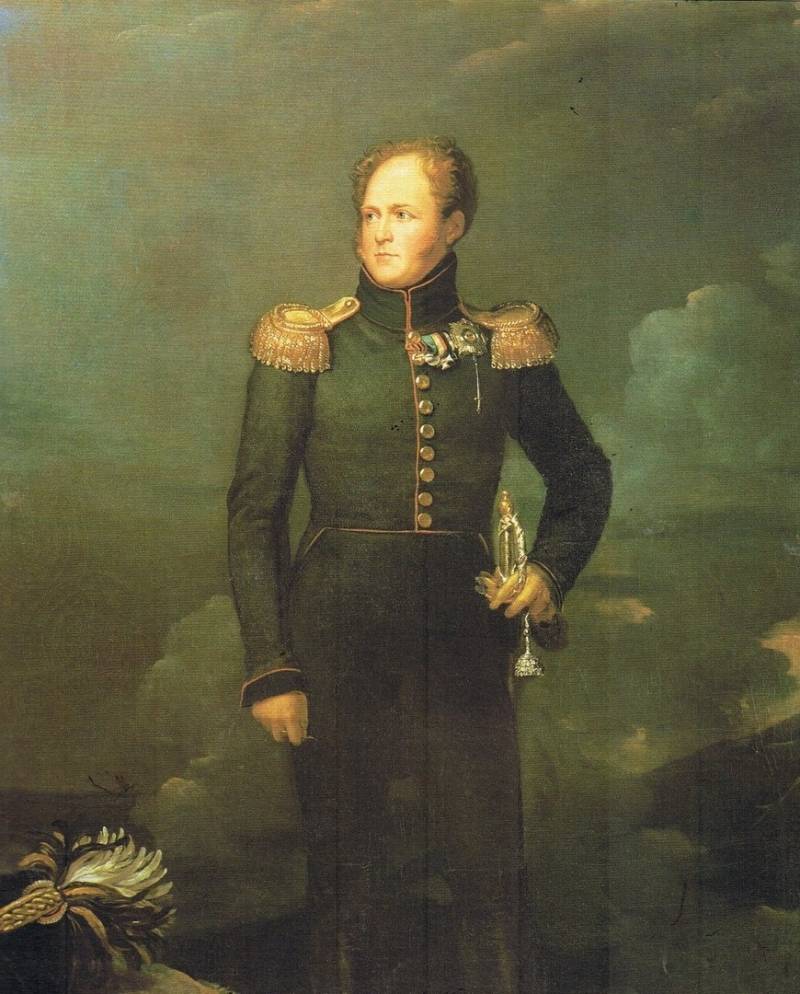
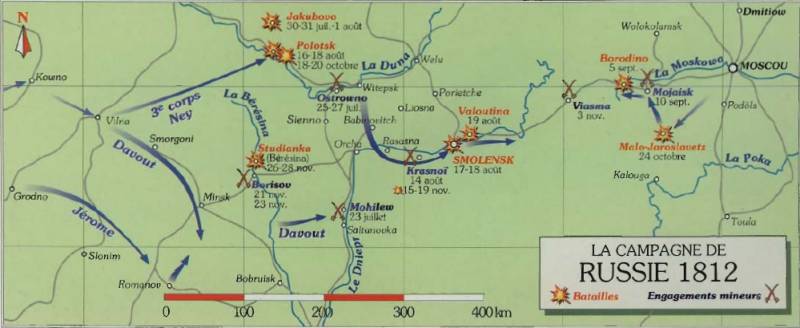
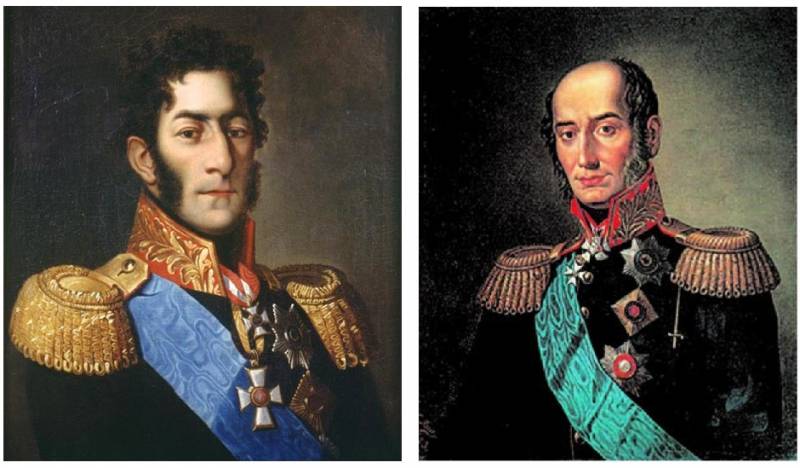
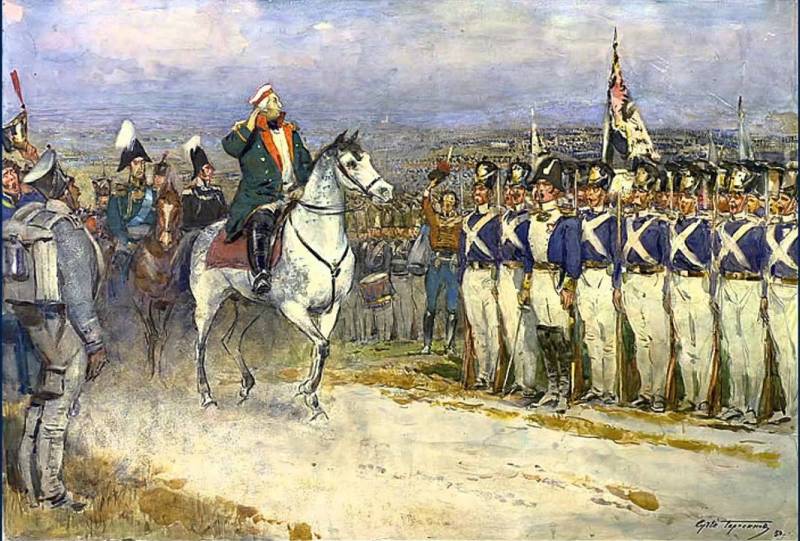
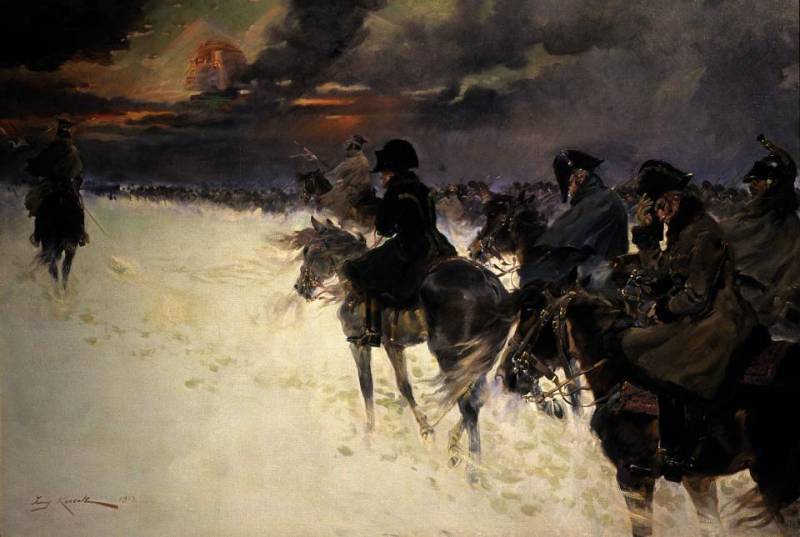
Information